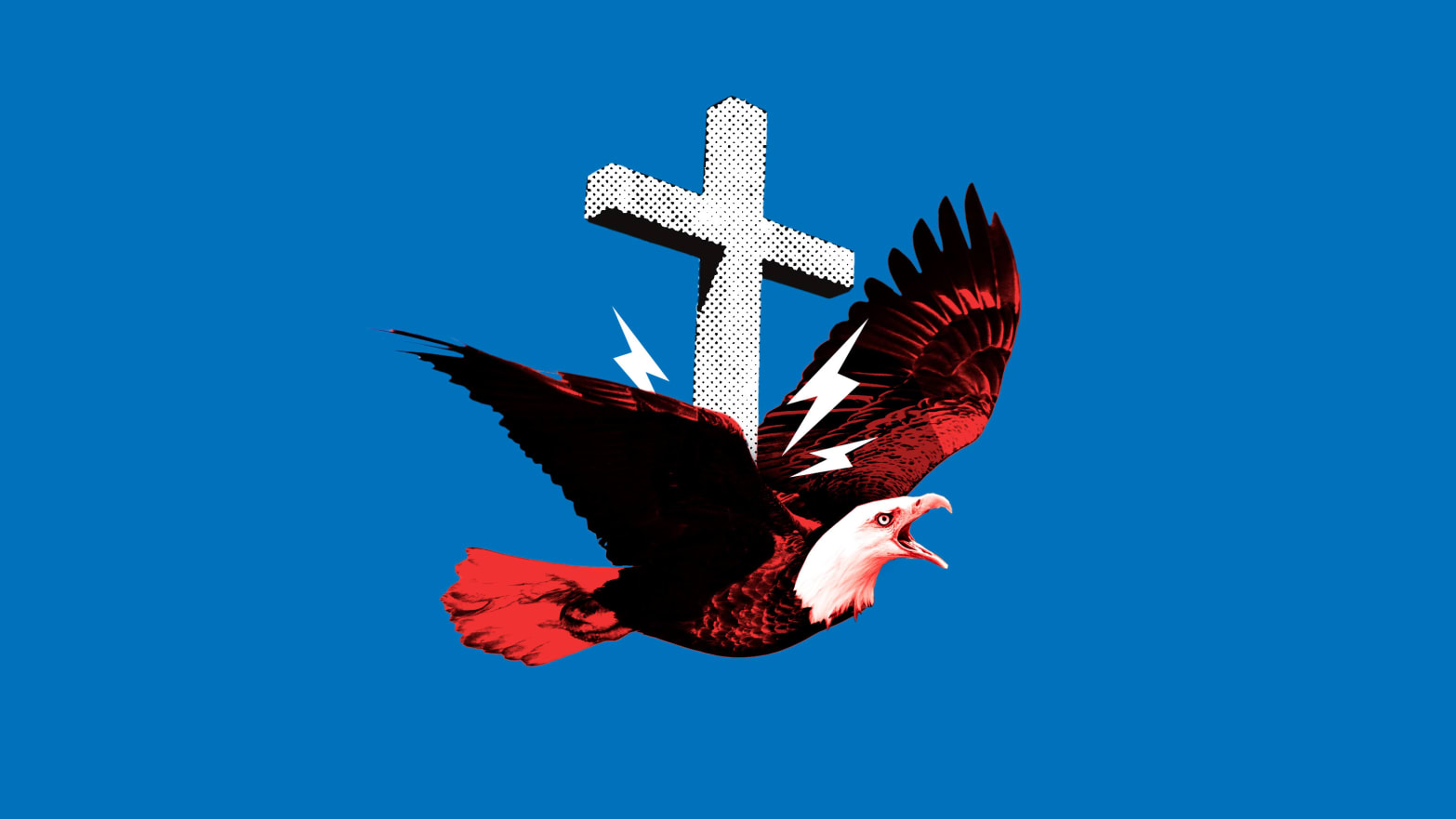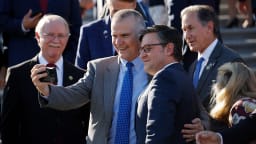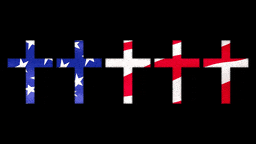One of us, a non-believing member of Congress, went to the recent National Prayer Breakfast. Christian nationalists moved it to the Capitol for the first time.
Rep. Jared Huffman
Andrew L. Seidel
Updated Feb. 08, 2024 6:28PM EST / Published Feb. 08, 2024 6:09PM EST
OPINION

Photo Illustration by Luis G. Rendon/The Daily Beast/Getty
Washington, D.C. is home to hundreds of churches; any would have been a more fitting location for a Christian church service like last week’s National Prayer Breakfast than the U.S. Capitol. In the prestigious National Cathedral, for instance, 4,000 worshippers could have enjoyed Andrea Bocelli’s melodious tenor and the Christian speakers, sermons, and prayers.
Unfortunately, some members of Congress—oblivious or hostile to church-state separation—are determined to make this annual Christian ceremony a government-run, taxpayer-funded institution, stamped with the imprimatur of Congress and the president. Essentially, a state church.
Last week, Speaker Mike Johnson, a strident Christian nationalist, moved the historically private National Prayer Breakfast into the heart of the U.S. Capitol, Statuary Hall, a blow to the separation of church and state he has long scorned.

The rationale for the National Prayer Breakfast—that our leaders must unite in Christian prayer because “the challenges that face them cannot be solved in their own strength”—ignores a lot of history.
When the Constitutional Convention deadlocked in June 1787, for example, Ben Franklin noted that the founders rejected his proposal for a prayer as “unnecessary.” Maybe that was because the first congressional chaplain turned out to be a traitor; or because framers saw no need for “calling in foreign aid” as Alexander Hamilton, perhaps apocryphally, put it; or that there were “no funds” for a prayer, as one delegate argued.
Our founders were focused on something more important, the most revolutionary act they would take that summer: creating humanity’s first secular government. Separation of church and state is an American original, born of the Enlightenment and implemented as a bold experiment. No other nation had sought to protect the ability of citizens to think and worship freely by divorcing religion and government. For 237 years, this “Wall of Separation” has succeeded spectacularly at protecting religious freedom, fostering a pluralistic democracy, and forestalling the abuses inherent in theocracies.
Christian nationalists, however, have never stopped trying to undermine it.
The National Prayer Breakfast began in 1953, part of the “golden age” of McCarthy-era Christian nationalism that brought the National Day of Prayer, “under God” in the Pledge of Allegiance, and “In God We Trust” as the national motto.
It was more than a response to godless communists, more than the “Jesus plus nothing” motto of the shadowy nonprofit (“The Family”) behind the breakfast; it was also about right-wing politics.
I’m a Cradle Catholic. I Don’t Want Christian Nationalism.
NOT IN THIS HOUSE
Alex Thomas

Princeton historian Kevin Kruse describes it as part of a coordinated attack on the New Deal by an unholy alliance of big business and conservative clergy. Building power and access for that alliance has defined the event ever since, as its many scandals illustrate. The breakfast has been an “influence-peddling bazaar” for lobbyists and foreign agents, riddled with anti-LGBTQ hatred. Last year, “The Family” funded a trip for 2023 Prayer Breakfast Co-Chair Rep. Tim Walberg (R-MI) to urge Uganda to “stand firm” behind it’s death penalty for LGBTQ people.
In a misguided damage control effort, Congress partially took over the event in 2023 and 2024. But they’ve created a host of new problems by holding an exclusionary Christian ceremony in the sanctum sanctorum of secular democracy.
“All faiths” were supposedly welcome, but who were they kidding? Jews, Muslims, Hindus, and other non-Christians were implicitly disinvited by “gathering in the spirit of Jesus and calling on the Lord in prayer,” at a program indistinguishable from a Christian church service.
“Nones” like us—people who identify as atheists, Humanists, agnostics, or nothing in particular—were categorically excluded. One of us, Rep. Jared Huffman (D-CA), Congress’ only Humanist, raised eyebrows by attending anyway as a quiet protest.
A congressman who loves America and wants to pray for it in his own non-religious way should never feel unwelcome in Statuary Hall. The Prayer Breakfast’s exalting of Christian privilege divides America along religious lines and flouts the equality our Constitution enshrines.
Anticipating accusations of “persecution” (the ultimate projection of Christian privilege), let us be clear: every American, and every member of Congress, is free to be Christian. But those who arrogantly seek to impose Christianity as a national religion should consider Ben Franklin’s admonition: “When a Religion is good, I conceive that it will support itself; and, when it cannot support itself, and God does not take care to support, so that its Professors are obliged to call for the help of the Civil Power, it is a sign, I apprehend, of its being a bad one.”
The co-chair of this year’s breakfast, Rep. Tracey Mann (R-KS), closed the program by proclaiming Christian prayer “our heritage.” Maybe for some, but not everyone.
A more universal part of our heritage—one that respects diversity, protects religious freedom, and is enshrined in the Constitution—is separation of church and state. Congress should reaffirm that great American heritage by fully disassociating from the National Prayer Breakfast.
U.S. Rep. Jared Huffman represents California’s 2nd Congressional District and is a co-founder and co-chair of the Congressional Freethought Caucus.
Andrew L. Seidel is a constitutional attorney, VP at Americans United for Separation of Church and State, and author of The Founding Myth and American Crusade.
No comments:
Post a Comment